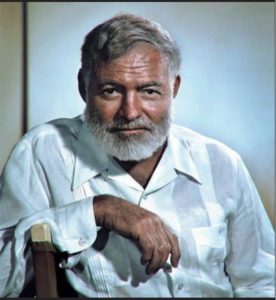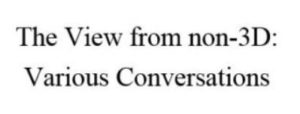Ernest Hemingway was smart, quick, experienced, and incisive. As an author he was superb. His novels are filled with life, and in them he has his characters say many memorable and valuable things, things that will enrich your life. He also has them say a very few silly ones, and ironically, the silliest thing he ever wrote is quoted on every side as if it made sense. From A Farewell to Arms:
“If people bring so much courage to this world the world has to kill them to break them, so of course it kills them. The world breaks every one and afterward many are strong at the broken place. But those that will not break it kills. It kills the very good and the very gentle and the very brave impartially. If you are none of these you can be sure it will kill you too, but there will be no special hurry.”
At best, this represents the despairing mood of a rather passive young man who was prone to fits of despondency. But look at those five sentences – really look at them.
“If people bring so much courage to this world the world has to kill them to break them, so of course it kills them.”
Read literally, this says that “the world” wars against brave people, that “the world” is out to break everyone, and those that will not break, “the world” kills. But does this view of “the world” as a sort of super-psychopath really reflect your experience of life?
“The world breaks every one and afterward many are strong at the broken place.”
Perhaps he is using the word “breaks” in a special manner, here. It is true that everyone in the world comes to know sorrow and suffering, but to grieve and to suffer is not necessarily to break. Do you think that everyone you know – including yourself – broke somehow?
“But those that will not break it kills.”
This is just plain silly, almost beyond comment. If death is a tragedy, then life itself is a tragedy, because all life ends in death, as all death prepares new life. Do you regard each new death as one more tragedy in a tragic world? And is it “the world” that brings death, or is it the process of living? And does death strike you as an act of malice? Is it not often an act of mercy?
“It kills the very good and the very gentle and the very brave impartially.”
If by this he meant simply that everyone dies, who could argue? But it seems to imply that “the world” has a special animus against “the very good and the very gentle and the very brave” and hustles them off the scene posthaste. Is that your experience of life?
“If you are none of these you can be sure it will kill you too, but there will be no special hurry.”
Again, the sentiment that screams out of these words is a sense of “the world” as the enemy of life; of life as an inevitable tragedy because it changes form (or, as he apparently thought, ends).
None of this lessens my immense respect for a very great author. And in fact I often feel sorry for Hemingway, in that the cultural beliefs he was born into made his life difficult. But we do him no honor to put on a pedestal one of the silliest things he ever had a narrator think, and read it in awe-struck veneration, just as if it made sense.



